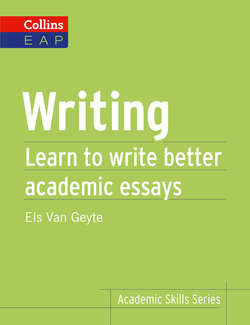Writing: B2+

Реклама. ООО «ЛитРес», ИНН: 7719571260.
Оглавление
Els Geyte Van. Writing: B2+
Contents
Introduction
Chapter structure
Authentic academic texts
Glossary boxes
Using Writing
Study tips
Other titles
1 Essay purpose and instructions
What is academic writing?
The purpose of essays
Analysing essay titles
Analysing key words and structure of essay titles
Remember
2 Reader expectation and essay structure
Making your essay more readable
Essay structure
The introduction
The conclusion
The main body
Guiding your reader
The structure of paragraphs
Connecting paragraphs
Remember
3 Essay content and language
Content and language
The beginning of the essay
Definitions
Indicating the importance of the topic
Introducing the aim and the organization of the essay
The main body: Organizational patterns
Using visuals
The language of conclusions
Remember
4 Formality, efficiency, modesty and clarity
Four principles of academic writing
Formality
Efficiency
Modesty
Clarity
Remember
5 Accuracy
The academic principle of Accuracy
Tenses
Subject-verb agreement
Punctuation
Articles
Common errors
Remember
6 Research and analysis
Research skills
Suitable sources
Note-making skills
Deciding on level of detail and what is relevant
Critical thinking skills
Remember
7 Reading comprehension
Analysing sentence structure
Possible difficulties
Analysing noun phrases
Identifying signposts
Remember
8 Authority
The principle of Authority
Developing a clear point of view
Stating your opinion: cautious language
The use of ‘I’ and ‘we’
Evaluating your own arguments
Remember
9 Integrity
The academic principle of Integrity
Citing and referencing
Acknowledging the ideas of others
Quote or paraphrase?
Avoiding plagiarism
Just a few reasons to avoid plagiarism
Other types of plagiarism
Following citation guidelines
Citation formats
Remember
10 Paraphrasing
Paraphrasing technique
The importance of integration
Showing where your point of view fits in
Integrating quotes and paraphrases grammatically
Choosing the right tense
Summarizing
Remember
11 Essay process and presentation
From essay question to meeting the deadline
The writing process
Planning
Analysing the question / producing an outline
Researching / making notes
For more information on researching and making notes, see Chapter 6. The first draft
The next drafts
The final draft
For more information on common errors, see Chapter 5
Layout and presentation
Analysing essay feedback
For more information on analysing essay feedback, see Appendix 2. Other types of writing
Remember
Appendix 1 – Taking your writing up to the next level: Example essays
Example essay 1
Comment and analysis
Example essay 2
Appendix 2 – Responding to marking criteria and feedback
Some final words from the author
Appendix 3 – Useful phrases
Linkers
Contrasting ideas
Talking about results
Talking about causes
Referring back to a previous point
Giving definitions
Using definitions
Indicating the importance of the topic
Intensifying adjectives
Introducing the aim and the organization of the essay
The language of conclusions
Counter-argumentation
Claims the author makes
The use of ‘I’ and ‘we’ to indicate the writer’s stance
Quoting
Paraphrasing
Reporting verbs
Glossary
Answer key. Chapter 1
Chapter 2
Chapter 3
Chapter 4
Chapter 5
Chapter 6
Chapter 7
Chapter 8
Chapter 9
Chapter 10
Chapter 11
Acknowledgements
About the Author
Отрывок из книги
Title Page
Introduction
.....
This question tells you that the media does misrepresent minority groups, but you will still have to briefly explain this in your essay, with examples. The question is whether this is always the case, i.e. whether there are examples you can give where the media represents minority groups correctly. You will also have to try and explain why this is or is not the case.
When the essay question is very long however, you should also analyse the structure of the question to make sure you give a full answer without including irrelevant information.
.....